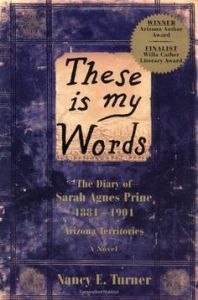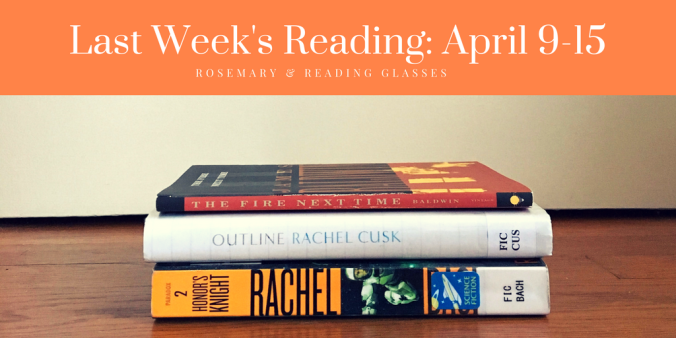 These Is My Words is a work of historical fiction (NOT a romance novel, despite considerable romance) loosely based on stories that the author, Nancy E. Turner, heard about her real-life great-grandmother, Sarah Prine. The story begins in 1881, when seventeen-year-old Sarah Prine and her family are part of a wagon train heading from the New Mexico Territory to Texas. Due to a series of calamities, the family ends up in the Arizona Territories, where Sarah struggles to run a ranch more or less on her own.
These Is My Words is a work of historical fiction (NOT a romance novel, despite considerable romance) loosely based on stories that the author, Nancy E. Turner, heard about her real-life great-grandmother, Sarah Prine. The story begins in 1881, when seventeen-year-old Sarah Prine and her family are part of a wagon train heading from the New Mexico Territory to Texas. Due to a series of calamities, the family ends up in the Arizona Territories, where Sarah struggles to run a ranch more or less on her own.
These is My Words: The Diary of Sarah Agnes Prine, 1881 – 1901 is one of our “family books,” that is to say, it’s a book that the women in my family pass back and forth and deeply love. These Is My Words has two sequels, Sarah’s Quilt and The Stone Garden. However, both my mother and I thought they were good but not as good as These Is My Words, which we have both read many, many times. This book is not a romance novel in the sense that the ending is bittersweet at best. However, it does contain a wonderful love story, and a wonderful portrait of a tough, smart, and frequently cranky woman, Sarah Prine.
From the start, Sarah is tough, fighting to defend her friends and family despite being uncertain about her life and being dazed with grief after seeing many deaths. I don’t want to spoil much of the story, but as she becomes a wife and a mother she develops a deeper layer of toughness beneath which there is a keen longing for education, a love of beauty, intense curiosity, and great affection for her loved ones. Sarah wishes she was more of a “lady” like her sweet sister-in-law, Savannah, but as Savannah tells her over and over again, her loved ones like her (and depend on her) just the way she is.
The best thing about the novel is Sarah’s voice and her character development as she grows from a naïve teen into a sharp businesswoman and rancher. Here’s an excerpt that shows off the keen business sense she develops as the story progresses, along with her sharp wit, and her independence. In this passage, Sarah is talking to a bank clerk in Tucson:
I went to one of the windows and introduced myself, and after I told the man what I wanted to do, he had the gall to sniff in my face and tell me to let my husband handle my money and not trouble myself with the confusion of it all.
Oh, I said, how confusing is it? If it makes you confused, I surely don’t want this bank holding my five hundred dollars.
Well, he perked right up and said, Five hundred dollars? I believe we can be of service to you after all.
I doubt it, I told him. I made this money with the sweat of my brow and the labor of my hands and I’ve got the rawhide to prove it. I don’t intend to leave it with any man that thinks money is confusing.
He puckered up his face kind of nervous and said, Oh, I assure you, Ma’am, we are not the slightest bit confused about money. We have a fifteen hundred pound safe, he says. Completely, one-hundred-percent theft proof…we offer one point nine percent interest, he said.
I stood up. Well, I told him, I can turn this around in supplies and stock and see about twenty-five percent interest on cattle as long as there’s no drought, and a hundred and fifteen percent interest on soap, more if there’s a drought. It’s a little at a time, but it comes right in steady as a clock. In case that’s confusing to you, Mister, it’s called profit. Thank you to you, and good day.
While the love story in this book is one of my favorites, this book is not and was not marketed as a romance novel. I don’t even want to spoil whom the romance is with given that early on there is more than one option. This is not a book that shies away from the realities of a hard and violent life and on many occasions you will need tissues and maybe some booze, although you will laugh a lot too. It’s a story about love, but it’s also a story about grief.
I want you to get to see the love story unfold for yourself. But I will say that it involves some banter, a lot of humor, brittleness and tenderness, and a lot of honesty. It also involves Sarah reading The Happy Bride, an instructional tome that advises Bible study as being “the first importance in being a wife.” But this book doesn’t end up being of much practical use to Sarah, who is very worried about an incident early in the book when she accidentally cries herself to sleep in a man’s arms:
As for that rainstorm and a certain soldier, I will just turn from my wicked ways and be sure never to place myself in a situation like that again. If I was, I would turn him away with a strong command rather than bawl like an orphan calf and fall asleep like I was safe with him. The book says “a young lady is never safe when in close physical proximity to a gentleman, and although he would pursue her, he thinks all the more of her of her if she rebuffs him heartily.” So I have thought of a hearty rebuff that I will tell that Captain Elliot if ever I see him again, or any man who presumes to be in close physical proximity.
The book doesn’t say what to do if you have slept in your underwear on top of a soldier in a wagon during a rainstorm. I will study this book so the first chance I get not to be an old maid I will be ready.
Best of luck with that book, Sarah.
One thing I like about this book is that while it stays true to Sarah’s perspective, it’s fairly even-handed in its treatment of Native Americans and in its treatment of other minorities. To be clear, Sarah is the narrator and this is very much a story told from a white pioneer perspective, which means that Sarah is often in deadly conflict with the Comanche and the Apache tribes. Initially, the attackers are presented as creatures of utter terror, raiding the wagon train and raiding local homes. They are nameless and faceless and everyone is terrified of them.
However, even early in the story, there are hints that Sarah is too smart and too curious to see people as caricatures. Early on, she has a silent moment of connection with a Comanche man who sees her kill a rapist. This man offers her silent respect, which Sarah clings to in the aftermath of guilt that follows the killing. Sarah is horrified to hear of massacred tribal women and children. She hears people arguing about how the wagon train people are encroaching on Comanche Territory, and she worries about it. Later, she hears about another character’s horrible sense of ambivalence in his job of chasing and capturing Geronimo. And eventually she learns more about the differences between local tribes after she hires an Apache woman to help her around the house, while she also becomes friends with a Yavapai man.
The book is very clear that the West wasn’t just a sea of whiteness. Sarah gets to know a Chinese family, and she becomes close friends with a Mexican family, from whom she learns Spanish and a lot of new recipes. It’s not that Sarah is incredibly progressive. It’s simply that Sarah tends to take people at face value. She likes people who share recipes and she likes people who chat with her on the porch and she dislikes people who shoot arrows at her even if she has some sympathy with their motives. She tends to see people as people, not as types, and she likes people who help her out and who let her help them in return.
I have a long list of trigger warnings for this book. First all, as much as I appreciate that Sarah sees Native Americans as individual people and does not look down on them, this is still a story about the white takeover of native lands, told from a white perspective. We already have a million stories about Indians attacking white people. This story is told better than most but it’s still the same story in many section of the book.
Also, there are multiple rape threats, rape attempts, and actual rapes. Children are frequently in peril and some children die. So do some animals. This book runs the gamut of emotions, and it doesn’t glamorize the hardships of the place and time.
I love this book for a lot of reasons. I have some family in Arizona, and that gives me some personal interest in the topic. I love the romance and the incredibly sense of place that is conveyed on Sarah’s ranch and in Tucson. I love the combination of dramatic events with every day life. But the main reason I love this book so much is because of Sarah and her unique and wonderful voice, and because of the different ways that female strength is portrayed in different characters.
This is an amazing story, beautifully and powerfully written and deeply feminist, but it’s not intersectional, meaning that it doesn’t address this lives of anyone other than Sarah’s family in much detail. However, if you want something historical that features more perspectives from non-white characters, here are some suggestions:
Wake of Vultures, and the sequel, Conspiracy of Ravens, by Lila Bowen
This Weird West series (not a series of romance novels) is narrated by a biracial, transgender man. The series includes characters of many ethnicities in its fantasy depiction of a West in which monsters, shapeshifters, and magic exist. I reviewed Wake of Vultures. Beware of literal cliffhangers.
The Girl With Ghost Eyes, by M.H. Boroson
I reviewed Girl with Ghost Eyes and loved the main character, a Chinese teenage girl who uses magic and martial arts to defend her family in gold rush San Francisco. Again, this is historical fiction, not a romance novel, although there’s some romance in it.
Bitter Springs, by Laura Stone
I wrote a capsule review of this book for RT Book Reviews. I loved this romance novel about Texas in the 1870s. Renaldo Valle Santos trains with Hank Burnett. Hank is Black, a freed slave who has made a name for himself as an expert on catching and taming wild horses. The two men fall in love and prepare to face the consequences with Renaldo’s traditional family.
Destiny’s Captive, by Beverly Jenkins
This book, which I reviewed here, is a romance novel that begins on the shores of Cuba but primarily takes place in 1870’s California. It involves a romance between Afro-Cuban Pilar and Afro-Spanish Noah. The book combines swashbuckling and shopping and a lot of female bonding, so catnip alert right there for most of our readers. The book is the third book in a trilogy that includes Destiny’s Surrender and Destiny’s Embrace, You can also enjoy Redheadedgirl’s review of another Western by Jenkins, Forbidden.
I also found this link, which features books by and about Native Americans.
http://www.bachelorsdegreeonline.com/blog/2011/the-20-essential-american-indian-novels/
Advertisements Share this:- More





